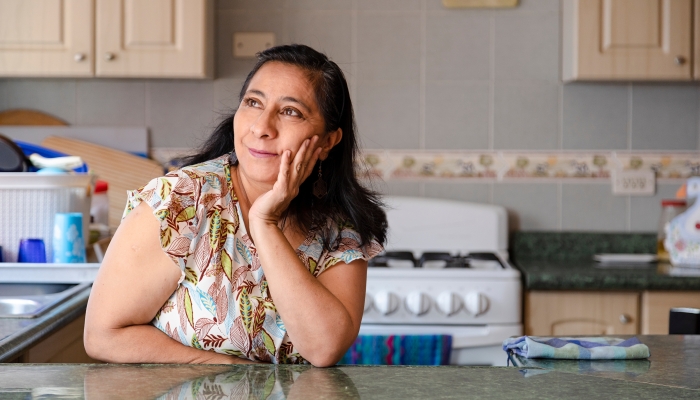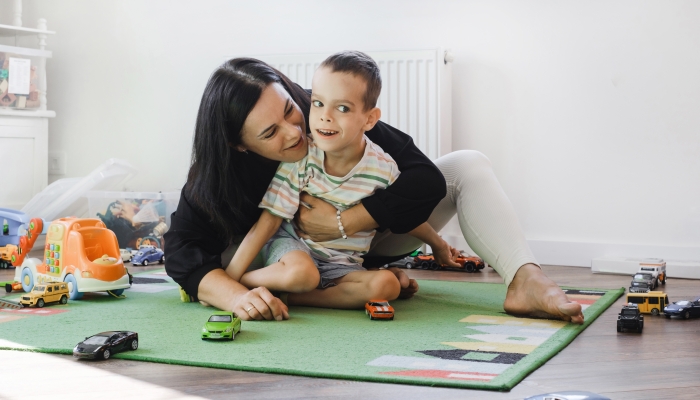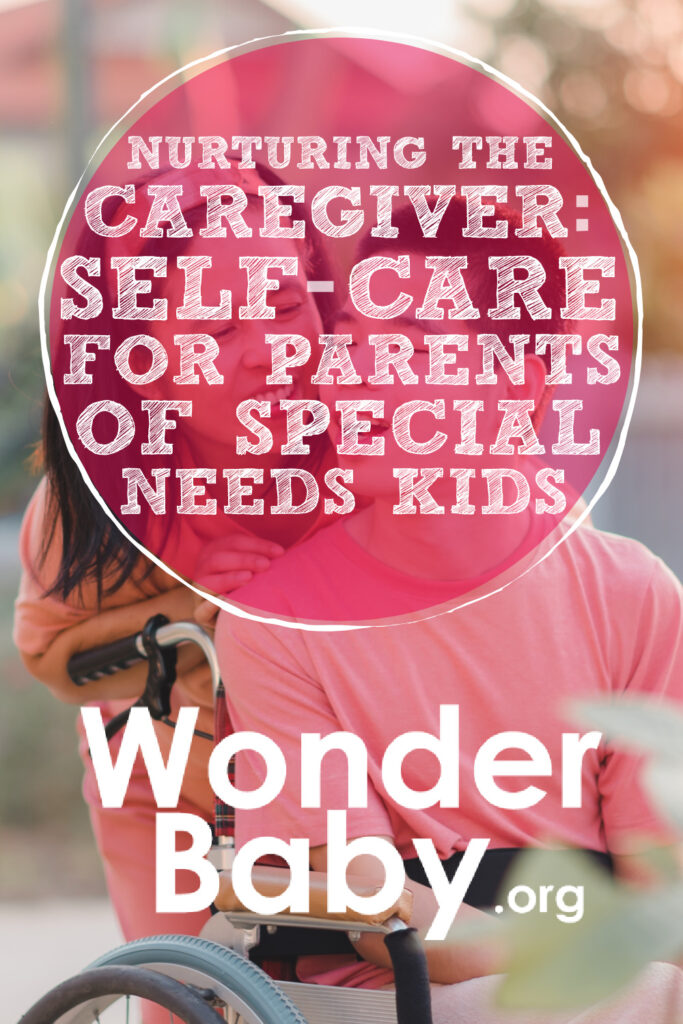Nurturing the Caregiver: Self-Care for Parents of Special Needs Kids

- The physical and emotional demands of caregiving often lead to chronic stress and exhaustion.
- Self-care is essential for maintaining emotional stability and providing quality care.
- Self-care includes good nutrition, exercise, enough sleep, and mental well-being.
Caring for a child with a disability can take an incredible toll on your physical and mental health.
Whether you wake up each morning to the sound of your special needs child calling for you or have whirlwind days filled with therapy sessions, school meetings, and ensuring the rest of your family’s needs are also met, it’s exhausting.
Self-care for parents with special needs children is a necessity.
If you’re like most parents, however, you probably put yourself last. This is unhealthy and leads to more stress.
It’s possible to balance the demands of caregiving with personal growth and happiness. Below is everything you need to know about and a guide to self-care while caring for a differently abled child.
Understanding the Need for Self-Care
We all need self-care. While it’s normal for parents to put their children’s needs first, it’s important to find a balance, especially when your child has additional needs.

The Impact of Caregiving on Personal Well-being
Being the caregiver of a special needs child is a challenging role. The day-to-day responsibilities can be overwhelming, affecting your mental and physical health, especially when you don’t have much support.
Constantly worrying about your child’s disability and the physical demands of caregiving, like lifting or personal care, can exhaust you.
This can lead to chronic stress, both physically and emotionally.
If you don’t manage caregiver stress, you’ll burn out.
Symptoms of caregiver burnout are serious. These can include:
- Anxiety
- Losing focus of your own needs
- Feeling unable to have healthy relationships with your other household members, family, or friends
- Depression
- Feeling emotionally detached from your special needs child
Burnout not only impacts your health, but also your ability to best care for your child.
Self-care is not a luxury but a necessity if you want to preserve the health of your entire family.
Self-Care as a Necessity, Not a Luxury

When it comes to parenting, self-care is often still seen as an indulgence.
Many parents—especially moms—get shamed when they take time for themselves and do anything that momentarily puts their children in the back seat.
However, temporary relief from stressful situations is one of the best ways to stay emotionally stable.
If you get enough sleep, make time for your interests, regularly exercise, or even spend time with friends, you’re more likely to be patient and emotionally available for your child.
Self-care can also include seeking professional help to manage caregiver stress or anxiety and joining a support group for helpful resources, sharing experiences, and finding community support.
Investing in your physical or mental health, however you choose, isn’t selfish. When you practice self-care, you directly influence the quality of care you can provide your special needs child.
Understanding this is crucial for the well-being of both you and your little one.
Physical Self-Care
As the primary caregiver for a child with disabilities, paying attention to your physical health is important. Daily care activities and stress can be strenuous on your body.
Here are some areas you need to focus on for optimal health:
Nutrition and Hydration

A balanced diet is not just about maintaining your health. The proper nutrients will give you the energy you need to be there for your children and ensure your immune system is in top shape to fight sickness.
You should eat foods rich in vitamins, minerals, and antioxidants.
Some good choices include:
- Dark, leafy greens
- Citrus
- Whole grains
- Fish
- Nuts and seeds
Hydration also plays a big role. Drinking enough water will keep your brain active and improve your overall mood.
Simple strategies like carrying a water bottle or swapping sugary drinks with water can make a huge difference in how you feel throughout the day.
Exercise and Physical Activity

Making time for exercise in your already packed schedule might seem challenging, but it’s a critical part of self-care.
Physical activity can bring your body some relief and also help manage stress.
On hectic days, try to incorporate short bursts of activity like stretching, walking, or somatic shaking.
When you have time for more structured exercise, you can:
- Practice yoga.
- Go for a walk or jog.
- Do an aerobic routine.
- Participate in a physical hobby.
These exercises will build strength and help keep stress away. They’ll also nurture your mental health and prepare you for your demanding caregiving role.
Sleep and Rest

If you’re getting enough sleep, your brain performance improves. This means you’ll be much better equipped to care for your special needs child during the day.
When you feel tired, you’re more likely to get unnecessarily irritated, be forgetful, and make mistakes.
Good quality sleep should be a non-negotiable.
You should create a comfortable sleep environment and establish a regular sleep routine. Avoiding stimulants like caffeine before bed is also recommended.
If you can schedule some rest periods throughout your day, do it! These breaks will help prevent burnout by recharging your energy levels. Even a short break to read, meditate, or drink tea can have rejuvenating effects.
Emotional Self-Care
If you feel well, you’ll be more confident in your ability to care for your special needs child and have an easier time coping with stressful challenges.
Here are some emotional self-care tips:
Recognize Emotional Needs

Recognizing signs of emotional exhaustion and depression is the first step you’ll have to take if you want to stay mentally well.
Symptoms like persistent sadness, loss of interest in activities, feelings of hopelessness, or chronic fatigue are red flags.
If you notice any of these signs, seek professional help.
Expressing and validating your emotions is also an excellent way to change how you’re feeling.
It’s healthy to speak to friends or family about your mental state.
Emotional support isn’t a luxury. Taking care of your mental and emotional health will make you a better, more empathetic caregiver.
Mindfulness and Meditation

Practicing mindfulness can reduce stress and improve your overall emotional well-being. The key is to start small.
Most practices are also easy enough for your little one to join in, so you can make it part of your daily routine.
Simple techniques like focused breaths or listing out loud what you’re grateful for can be powerful tools.
If you like using apps, Headspace or Calm offer guided meditations, stress management tools, and sleep stories specifically designed to help caregivers unwind and find balance.
Hobbies and Interests

Hobbies like gardening, painting, or reading provide a relaxing break from your caregiving duties and help prevent caregiver identity loss.
Your hobbies and interests can help you gain a sense of achievement and fulfillment outside your caregiving role, making it feel less consuming and draining when you step back into it.
Try choosing activities that are relaxing and rewarding. This will remind you that while caregiving is part of your life, it doesn’t define your entire being.
Social Self-Care
Caring for children with disabilities is a demanding role. Maintaining a social life may be secondary. However, social self-care is crucial for emotional support and a sense of normalcy in the life of a caregiver.

Here’s how you can make time for your other relationships:
Nurture Relationships Outside of Caregiving
Staying in touch with family and friends can make you a better caregiver. These relationships can remind you that you have an identity beyond your caregiving role and offer new perspectives and ideas for caring best for your child.
If time is limited, remember that staying connected can be through brief interactions.
You can use social media to update friends or faraway family about your life by regularly posting photos or thoughts and having short chats in the comment sections.
Video calling is also low-effort. You can call people whenever—while having breakfast with your little one, going for a walk, or doing a hands-off activity. This can make you feel less isolated and give grandparents or your child’s favorite aunt a chance to be part of their day.
Scheduling alone time with your other kids or planning a date night with your partner can also be incredibly beneficial for you and your bond with them.
Create a Caregiving Community
There’s no better way to feel supported than connecting with people in similar situations. Building a network of fellow caregivers can be the strength you need.
Local or online support groups for parents of children with disabilities offer a platform to share your experience, advice, and emotional support.
You can also attend social events with other families or join and even organize group activities in your area. It could be simple outings, like a picnic in the park, a group walk, or a playdate.
Spending time with others who understand caregiving’s unique challenges and joys can be rewarding and relieving.
Set Boundaries
Healthy boundaries are crucial if you want to prevent burnout. You have to set them up with family, friends, the caregiving community, your partner, and even your special needs child.
This involves sometimes saying no, giving others some of your load, and not overcommitting yourself.
Setting boundaries is about recognizing when you can manage on your own, when you need help, and when you need space.
Without this balance, you’ll struggle to maintain a sustainable caregiving routine.
Boundaries can include:
- Shutting opinions from the caregiving community out if what you’re doing for your child or family works.
- Delegating tasks to other family members.
- Hiring external assistance.
- Scheduling special time with your other children and partner.
- Saying “no” to your other children and partner’s need for attention when you’re burned out.
In his article, Siblings of Children with Disabilities11. Milevsky, A.. Siblings of Children with Disabilities. Psychology Today. 2014. https://www.psychologytoday.com/us/blog/band-brothers-and-sisters/201406/siblings-children-disabilities, psychologist Avidan Milevsky states that your non-special needs children might feel a burden to be perfect and even take pressure off you.
It’s also common for marriages to face more problems when one or more children have a disability.
This is part of why balancing your caregiving duties and life outside of it is so important.
Creating a Sustainable Self-Care Plan
Self-care plans are more likely to succeed if they’re achievable and flexible, especially if you have a differently abled child.
Here are some tips for creating a sustainable self-care plan:
Set Realistic Self-Care Goals

Your self-care plan should be tailored to fit the unique challenges and demands of caring for your child.
Start by setting small, attainable goals, like dedicating a few minutes each morning to drinking tea or practicing mindfulness before everyone else in the house wakes up.
You could also give your caregiving responsibilities to your partner for an hour twice or thrice weekly once they get home, so you have time for a relaxing bath or to catch up on some reading.
Monitoring and adjusting your self-care plan is another essential part of this process. If a particular part of your strategy is too time-consuming, switch to shorter activities or breaks instead of giving it all up.
Regularly checking in and adjusting your plan will ensure it stays practical and relevant to your changing circumstances.
Integrate Self-Care into Family Life

Teaching all your kids about the importance of self-care is a valuable life lesson. You should not only demonstrate self-care practices but involve them in some of your activities.
Involving the entire family also creates an opportunity for enjoyable bonding experiences. Here are some suggestions:
- Family walks
- Group exercises or sport
- Cooking healthy meals together
- Arts and crafts activities
- Watching movies
These activities can help relieve daily stress and create a more inclusive home environment.
Balancing Self-care and Caregiving

Balancing your own needs with the endless to-do list of parenting a special needs child can be tough. Sometimes, it’s hard to remember that looking after yourself isn’t just good for you.
Self-care can make you a better parent, which is why it’s so important.
Taking time for yourself doesn’t mean you’re neglecting your caregiving duties—it means you’re equipping yourself to handle them better.
Reference
- Milevsky, A. (2014, June 6). Siblings of Children with Disabilities. Psychology Today. https://www.psychologytoday.com/us/blog/band-brothers-and-sisters/201406/siblings-children-disabilities

Related Posts

Eye Conditions and Syndromes, Visual Impairment
Neuralink Announces Plans to Restore Sight to the Blind with Brain Chip
Elon Musk’s company Neuralink has announced plans to begin human trials of its new “Blindsight” brain chip by the end of 2025.

Special Needs
5 Spring Cleaning Tips for Families of Children with Disabilities
Spring cleaning is an opportunity to create a more accessible, organized, and supportive space for your child with disabilities. Declutter, deep clean, and refresh!

Visual Impairment
The Gift of Understanding: How a Young Child Helps His Blind Father Navigate Life
When a parent is blind, it’s natural for people to wonder how their sighted child will adapt. Will they struggle to understand their parent’s needs? Will they feel burdened by...